The Nexus 7 (2013) Review
by Anand Lal Shimpi on August 22, 2013 6:00 PM ESTPlatform Power & Battery Life
The new Nexus 7 moves to a slightly smaller battery compared to its predecessor (15Wh vs. 16Wh). The result however is anything but a reduction in battery life. ASUS and Google worked hard to reduce platform power consumption as much as possible. I instrumented both Nexus 7s and measured total platform power, excluding display, to look at the impact of the silicon platform (SoC, PMIC, DRAM, eMMC, WiFi, etc...). The results are beyond impressive:
Idle power is cut in half compared to last year's model. This is by far the most important improvement as most mobile usage models tend to have long periods of idle time. We'll see these power gains reflected in our web browsing test which does have significant periods of simulated reading time between web page loads. The power reduction while running Kraken grows to just over 20%, and even while running Geekbench 3 we see a 16% drop with the new Nexus 7. Only our offscreen 3D test manages to draw more power on the new Nexus 7 than the old one, and that isn't taking into account the nearly 5x increase in performance on the new Nexus. In fact, as impressive as these numbers are - they are even more impressive when you take into account performance. To make a long story short, don't worry about the ~7% decrease in battery capacity as there are enough improvements in platform power and performance (and thus perf per watt) to more than make up for the smaller battery.
We'll start out with our WiFi web browsing test. Like all of our battery life benchmarks we run this test with all devices calibrated to 200 nits and connected to 5GHz 802.11 WiFi (if supported). The test itself cycles through a bunch of desktop websites at a very aggressive frequency. Our test ensures that both the CPU cores and wireless stack can reach their deep sleep states during simulated reading periods. The test continues until the battery is depleted.
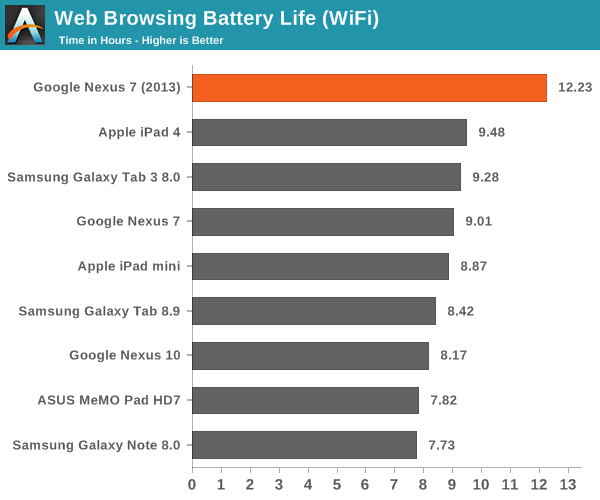
The new Nexus 7 does better here than any other small tablet we've ever tested. Remember that 50% decrease in idle platform power? That's exactly why we're seeing a 35% improvement in battery life compared to the original Nexus 7.
Our video playback test involves looping the playback of a 4Mbps 720p High Profile H.264 transcode of the last Harry Potter Blu-ray. All displays are calibrated to 200 nits.
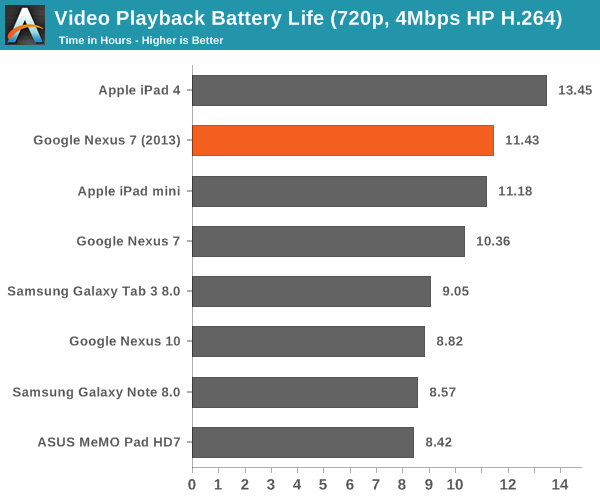
Video decode blocks are fairly well optimized to begin with, so there's not a ton of room for improvement here compared to last year's Nexus 7. Despite the ~7% shrink in battery capacity, the new model manages a 10% increase in battery life though. We also have the first small Android tablet capable of beating the iPad mini in a video playback test here - job well done ASUS/Google.
Our final test involves looping the Egypt HD benchmark until the battery is completely drained. Frame rates are capped to 30 fps to somewhat simulate actual gameplay and not penalize faster GPUs.
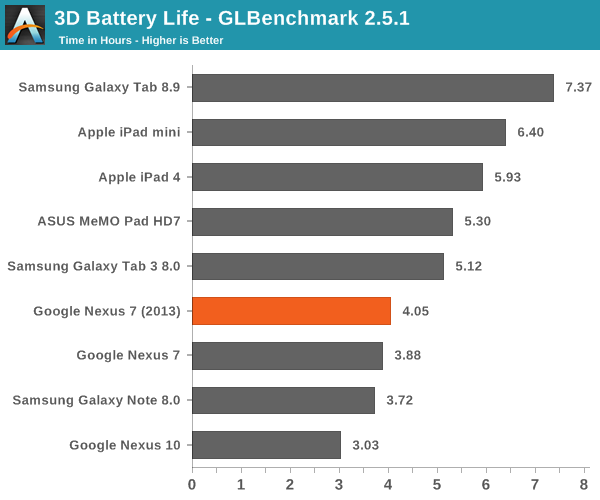
The new Nexus 7 manages to deliver slightly better battery life here despite driving higher frame rates and more pixels. Overall performance here isn't anything super impressive, the only average showing from the Nexus 7.
Google ships the Nexus 7 with an ASUS branded 7W charger, identical to the one you'd find in the box of a MeMO Pad HD7. Given identical chargers and battery capacities, there's no surprise the new Nexus 7 takes the same amount of time to charge as the MeMO Pad HD7 (~3.5 hours).
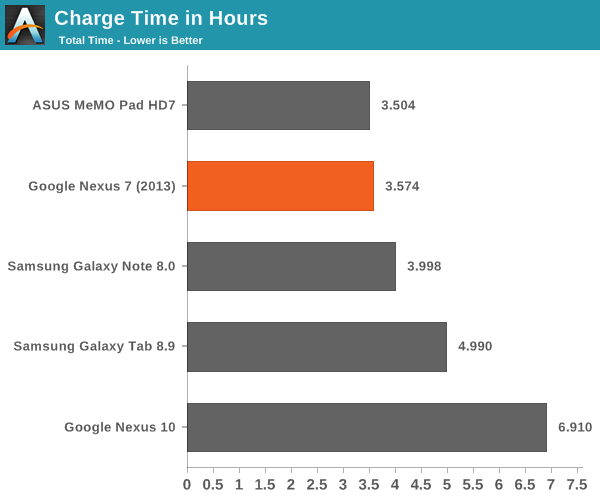
The new Nexus 7 also supports wireless charging by implementing the Qi standard. Charge time is a bit slower wirelessly as Qi can only charge at up to 5W. Brian tested Qi functionality in his mini review of the Nexus 7 and didn't have any issues.


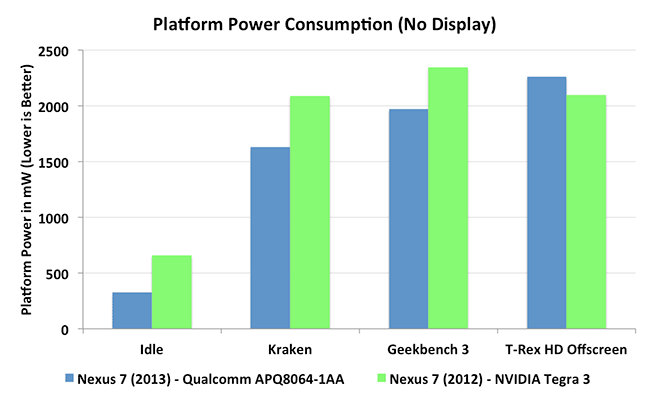
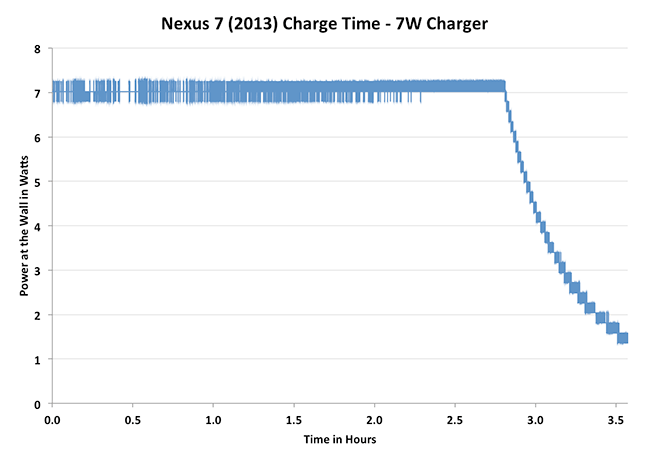








202 Comments
View All Comments
JDG1980 - Thursday, August 22, 2013 - link
This is Anandtech, not the Wall Street Journal. Why are the business strategies of these companies relevant to who provides the best device at the best price? Why should consumers care who is subsidizing what?BMNify - Thursday, August 22, 2013 - link
Copy pasting from my above comment as you didn't go through it: If subsidised hardware kill off the hardware manufacturer's then you will be left with a monopoly that is Google who can charge you more later and make money on Ad's too like they do now. This is the reason why selling at-cost or dumping is not desirable.smartypnt4 - Thursday, August 22, 2013 - link
Interesting perspective. I hadn't heard a well-reasoned argument against selling at or near cost before now. Also, do you have a source to back up the claim that ASUS is making a significantly smaller margin on the N7 than they are on their other devices? Their MemoPad HD 7 is a 2012 N7 clone that's $150, so if the 2013 N7 is at cost, that has to be as well. And that's not being subsidized by Google, so if it were really at cost without some hypothetical Google subsidy, why would ASUS bother designing and selling it?psyside1 - Friday, August 23, 2013 - link
Thanks alot Anand, for listening us, and put the 16 vs 32GB version in your review, now i know i want the 32GB version! fanstastic review.ASEdouardD - Friday, August 23, 2013 - link
I know it's a great thing to add in the review, but I would frankly would have preferred not to know! As I bought the 16 GB model, hehe. Doubt it has a big impact on real world use though.akdj - Sunday, August 25, 2013 - link
Google most likely pays ASUS to make the tablet....they pay the price of the BOM & labor directly to ASUS. That's how they are making their money. Google is essentially giving the tablet away for you, and everything that IS you. Your friends. Your contacts. Your email. Your documents and music and movies....and, what they call the 'data mine'. They sell that info to third party companies and probably double their original $200 investment to ASUSsmartypnt4 - Sunday, August 25, 2013 - link
According to what evidence? It's widely known that Apple takes a very large margin on their products, which the Mini being the lowest margin (~40% if I remember correctly). There has been no indication of what the Nexus 7 actually costs to build. My point is that ASUS is selling their own tablets without Google at prices that make me think that the Nexus 7 isn't actually being sold at or under cost. I'm thinking it's probably relatively low-margin compared to the iOS devices, but everything in technology is low margin compared to iOS stuff (except Intel processors, that is).And yes, Google uses your information to target ads at you. That's not really news to anyone, and anyone buying into Android better know and be OK with that, or just not care.
amdwilliam1985 - Monday, August 26, 2013 - link
Thanks for the insight info about Google spying on us. Let's run the other way, Apple/M$ are so great and never touch our private sensitive data. Our data sitting in icloud/skydrive are so magical that nothing comes and tint it. Oh just how I love facebook is doing everything they can to make us feeling safer/happier about posting everything onto it. man oh man, the 21st century is all about Google mining your/our data and every other companies protecting you/us ;) /sSarcastic off, man grow up, crying about Google spying on you, lol. The way I see it is that if they're going to data mine us one way or the other, why not benefit from it? Why pay for your device twice? Once in privacy and once in physical dollar. I'm going with the one that I think is the least evil of them all, Google. Yes, I've used apple products before, didn't like how restricted iphone/ipad are. Didn't like how macbook air can't install the programs that are only running in windows, sigh...
Mivo - Friday, August 23, 2013 - link
You should probably post some sources for your claims. That aside, what is and is not desireable is a matter of perspective. I'd wager that most end customers are fine with ads or a walled garden, if that substantially lowers the price of a device. Just look at Amazon and their customers. (Or look at Apple and their customers who happily pay premium prices in spite of the walled garden.)Ananke - Friday, August 23, 2013 - link
Example: Asus buys from Foxconn at $220, and sells for $229. If it costs Foxconn 29.99 to manufacture and sell to Asus, is it considered "sold almost at cost" to end users by your logic?